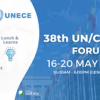News
Displaying Results 76 - 100 of 128
Recent disruptions of supply chains have exposed fragilities in the current trading system and brought to light the importance of resilience and transparency in global trade.
UNECE and other international organizations play a crucial role in supporting countries (including both the public and…
The textile industry is a key driver of Uzbekistan’s economy, reflected in the country’s rank as sixth largest cotton producer in the world. In 2021, the country accelerated the battle against its child and forced labor violations in cotton harvest according to a new International Labour…
As supply chains within the garment and footwear sector are becoming increasingly complex, the need for transparency is more relevant than ever. Consumers, investors and shareholders are pressing for transparent business activities as well as the prevention and mitigation of risks in value chains,…
With the review of the amended Protocol to Abate Acidification, Eutrophication and Ground-Level Ozone (Gothenburg Protocol) under the UNECE Convention on Long-range Transboundary Air Pollution well underway, experts further discussed the sufficiency and effectiveness of current measures at the 60th…
Global trade has been transformed repeatedly throughout history, driven by new business processes and new policies. The new advances in digitalization now promise further transformation by making it faster, more transparent, reducing risks of red tape and corruption. With the increase in global…
Over 60 participants worldwide joined the online roundtable organized by the UN Digital transformation group for Europe and Central Asia (DTG4ECA) in the framework of the Regional Forum on Sustainable Development for the UNECE region. Established in May 2020, DTG4ECA group, co-chaired by UNECE and…
The residential sector is one of the major consumers of energy in many countries. In Armenia, for example, it accounts for 33% of total energy use. Rising fuel prices will bring substantial affordability challenges for low-income customers to heat their homes. According to UNECE research, at least…
Strengthening value chains between Africa and the European Union (EU) is a priority objective for sustainable growth and decent jobs across the two continents. Recent market imbalances and disparities, involving supply chain disruptions and lack of attention to the social and environmental impacts…
The global economy enters 2022 with new challenges. Almost two years into the Covid-19 pandemic the digitalization of transport and trade data flows is on top of the economic agenda. In response, UNECE organized its 4th workshop on trade facilitation, Single Window, and data sharing for the Western…
Improving energy efficiency is one of the most cost-effective options for climate action and to meet growing energy demand in most countries. It contributes to energy security, a better environment, improved quality of life, and economic well-being. Out of all sectors of economic activity, the…
Trade facilitation is a key priority for Kyrgyzstan and its trading community for participation in the global and regional trading system. Under the project on “Strengthening the capacity of the Kyrgyzstan National Trade Facilitation Council to implement the WTO Trade Facilitation Agreement”, UNECE…
Complex global value chains include production facilities scattered all over the world. Sometimes, they may also involve practices of illegitimate subcontracting and undeclared informal work. In fact, their complexity and opacity make it very hard to gain accurate information about how and where…
COP26 was a positive step forward in the fight against climate change, but as the UN Secretary General pointed out in his comments: “it is not enough. We must accelerate climate action to keep alive the goal of limiting the global temperature rise to 1.5 degrees.” The compromise deal reflects the…
As all eyes turn to Glasgow where world leaders have gathered at COP26 for crucial negotiations to cut greenhouse gas (GHG) emissions and limit global warming, UNECE experts highlight how improved transparency and traceability could be part of the solution. The private sector has a vital role to…
The Group of 7 nations (G7), six of which are UNECE member States (Canada, France, Germany, Italy, the UK and the US), took bold step towards reducing barriers to trade by agreeing on the principles to govern cross-border data use and digital trade. At their meeting in London on 22 October,…
A map of air pollutant emission sources of a given country can help experts and decision-makers understand which policies are most viable. Spatial allocations of emissions are also important to understand where emissions are coming from on a regional level.
Spatially allocating – or gridding –…
The COVID-19 pandemic restrictions have brought the benefits of paperless trading to the forefront of attention. Many countries are considering issuing, accepting and exchanging electronic documents for paperless trading. Issues related to paperless trading are also at the core of World Trade…
An exhibition of urban sketches by Architect Norman Foster is opening today at the Palais des Nations on the occasion of the UNECE Ministerial Meeting on Urban Development, Housing and Land Management (6-8 October). The sketches present visions of city planning that incorporate concepts of…
With the review of the amended Protocol to Abate Acidification, Eutrophication and Ground-Level Ozone (Gothenburg Protocol) well underway, expert groups under the UNECE Air Convention are now collecting information to assess the effectiveness of measures.
The amended Protocol establishes legally…
With the UN Food Systems Summit taking place next week under the auspices of the UN General Assembly (23 September 2021), we must recognize that the food systems we have built over recent decades are unsustainable. The food choices we make every day as consumers and producers of food are having a…
The need to digitalize information flows in international supply chains became clearer than ever during the pandemic, thanks to the reduced person-to-person contact this allows, on top of important efficiency gains. However, efforts to date have been fragmented. UNECE and its subsidiary body UN/…
The new UNECE Guide on producing CPI under lockdown, published today, helps national statistical offices to produce the Consumer Price index (CPI) under periods of lockdown and other emergencies.
The Consumer Price Index, or CPI, is a key economic indicator in most countries, giving a …
A coordinated response is necessary for promoting and implementing the circular economy agenda globally. Concrete commitments from governments, businesses, international organizations, civil society and other stakeholders will be key to building the sustainable, resilient and low-carbon economy…
Countries of Central Asia, the Caucasus and Eastern Europe have been hit hard by the socioeconomic impacts of the COVID-19 pandemic, which threatens to derail sustainable development progress in the region.
However, there is also a stronger momentum towards regional cooperation, and countries can…
Overfishing threatens the sustainability of maritime resources and endangers food security. In the last few years, the share of fish stocks that are within biologically sustainable levels has reached its lowest point in history, down from 90% in 1974 to 65.8% in 2017. Illegal, unreported and…


























